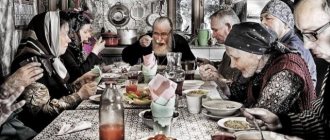What to do after a funeral: Orthodox traditions: Pixabay In Orthodoxy, it is believed that the souls of the deceased linger on earth for 40 days. During this time, loved ones can pay tribute to the departed, say goodbye to him and see him off to another world. What traditions must be observed to help the soul of the deceased find peace and enter God's kingdom?
20 days after death, what does it mean, what happens to the soul
In the interval between 9 and 40 days from the moment of death, the soul goes through 20 ordeals. At this time, demons experience a disembodied shell. But this process is described as strictly as possible, which makes it possible to convey to the average person in a metaphorical form the essence of the processes occurring with the soul. There is no such information in the Holy Scriptures; it is given in the lives of the Saints. Moreover, the general process of going through the ordeal is described; there is no more accurate information, so it is difficult to imagine what events develop in the hellish abodes on the 20th day after death. The ordeals that the imperishable shell goes through around this time:
- idle talk;
- lie: conscious, unconscious;
- condemnation;
- abuse of food and alcoholic beverages;
- lack of desire to work;
- robbery, any form of theft;
- greed, which speaks of the love of money;
- such a character trait as the desire to give a bribe;
- vanity, which makes the soul perceive itself as a form of life superior to all others;
- envy;
- pride;
- tendency to anger;
- rancor;
- robbery;
- desire for black and white magic;
- fornication, this also includes sodomy and adultery;
- idolatry;
- cruelty of character.
How to count the day of funerals and memorials. Days calculator
When a person has passed away, the countdown of subsequent dates for his commemoration begins on the same day, even if there are only a few minutes left until midnight. To make it easier to understand, consider an example. If a relative dies on Wednesday, the day of the funeral, 20 days of commemoration are counted starting from this day. The burial process is scheduled for Friday, according to Orthodox canons. Memorial Day is counted in the same way.
If there is no opportunity (time or energy) to perform simple actions on your own, use a calculator.
Receive compensation for a funeral or burial benefit
For every citizen of our country, a state funeral benefit is allocated. In January 2022, its amount is 6,424.98 rubles, not including additional local payments, the amount of which may vary depending on the region. For example, in Moscow such benefits are paid in the amount of 19,049 rubles 98 kopecks. This figure includes a fixed benefit and the Moscow supplement (12,625 rubles).
There is also a circle of people who are entitled to federal or local benefits, various allowances and compensation, for example, for perpetuating memory. These include:
- veterans of the Second World War and other military operations;
- persons nominated for state awards;
- employees of government ministries and departments (Ministry of Internal Affairs, State Defense, Ministry of Emergency Situations, FSB, State Customs Committee, etc.)
- disabled people.
If relatives want to receive benefits or compensation, you need to remember several important rules:
- the benefit is paid to the person responsible for conducting the funeral;
- compensation can only be claimed if the relatives conducted the funeral at their own expense;
- the period allotted for receiving payments is 6 months from the date of death;
- You can receive payments from territorial pension authorities, as well as from military registration and enlistment offices (depending on the affiliation of the deceased).
Conditional division of any commemoration
When a close relative dies, he is seen off on his last journey using mixed rites: church and secular. This is due to the fact that a significant share of traditions came from pagan times. But today their meaning has already changed. For this reason, you can use each of the rituals without fear for the purity of your soul.
Despite the conventional division of traditions into church and secular, they should be applied simultaneously, which contributes to a more complete disclosure of the meaning of the funeral meal. At the same time, only the church tradition can exist separately, since it was formed on the basis of Orthodox canons, and secular rituals do not reflect the essence of commemoration deeply enough, which translates them into the category of auxiliary.
Church Events
The main help for the soul comes from the clergy and those relatives who read prayers. For this purpose, services are held in the temple:
- memorial service;
- lithium;
- forty
To be included in the list of those who are prayed for at the service, you must submit a note indicating your name. Then what happens in the temple will directly affect the soul of the deceased.
Funeral dinner
Relatives gather around the table to remember the deceased. Moreover, the meal itself is not obligatory; more important are the prayers that are read at the same time, as well as the warm words spoken by those who came to remember the deceased. The main dish is kutia - this is a kind of alms for the deceased. Accordingly, there is no urgent need for food. It is only a means to achieve a goal, a kind of attribute of the ritual of remembrance.
How to properly order a funeral service for a newly deceased person
In the first year after death, it is recommended to order services in the church for the soul of the deceased. It is recommended not just to write the names of the people being commemorated, but to be at the church ceremony yourself. In this case, church prayer will have even greater power. Relatives will be able to receive spiritual strength to survive the loss of a loved one:
- In order for a memorial service to be held for a deceased relative, you must come to the church and go to the candle counter. There you will need to list the names of deceased relatives on a special sheet of paper.
- Simultaneously with the presentation of the note, it is customary to carry food, which is placed on a special table. It is believed that this food is intended for the deceased so that they have something to eat in the next world. As soon as all the prayers have been read, the food is blessed and distributed to the church parishioners. It is recommended to bring products that have a long shelf life.
At the beginning of the service, they take candles in their hands and light them. The candle flame signifies a person’s faith in a clean and bright future.
As soon as the service ends, the candles are extinguished. Believers do this as a sign that the life of every person on earth will soon extinguish in the same way.
Farewell to the body for 3 days. Why can't you bury earlier and later?
There are several reasons why it is necessary to perform the burial ceremony only on the 3rd day. First of all, they note the presence of the soul on earth. She remains here until the 3rd day, after which she appears before the Lord. This means that the first date of the wake falls on the third day. An earlier burial and meal may cause pain to the deceased (his spirit) because the memory remains after death. The incorporeal shell remembers loved ones, as well as the actions that the person performed during life. It's hard for her to watch everything that was familiar disappear. This does not allow the soul to go through ordeals, it will delay it between worlds.
The soul leaves the body
Another reason is the decomposition of the body. When the death of the physical shell occurs, negative processes begin to develop almost immediately. If you wait a long time for the funeral, the tissues will be modified so much that it will be difficult to recognize the deceased.
Organization of funeral on day 3
A person can die without accomplishing what he planned. But the Orthodox religion provides for the possibility of properly preparing the deceased for the transition to another world so that the disembodied shell does not feel anxiety, worry, or fear. To do this, it is necessary to organize the procedure for burial and commemoration of the deceased.
Funeral service for the deceased
Most often, the deceased is buried in a church; you must also take with you the kutya prepared the day before. This will allow it to be sanctified. At the same time, the basis is created for a calmer transition to the next stage (the soul appears before the Lord, after which it goes to heaven).
Burial or cremation
According to Orthodox traditions, believers often choose the funeral process rather than cremation. Although this option is acceptable, there is no strict ban on its use, but there is a lack of trust in this burial method. He is unusual for this area.
Burial of the deceased
Memorial meal for the deceased
Kutya is prepared from wheat or rice - the main dish of the funeral table. But along with it there should be hot food (first, second course), compote. Dessert is not prepared, with the exception of pancakes.
Traditional menu
Common dishes for funerals:
- pancakes with or without filling;
- cutlets;
- Fried fish;
- borscht or noodles;
- roast;
- sandwiches (with fish, vegetables);
- salads: “vitamin”, “3 jars”, “vinaigrette”;
- jelly or compote; uzvar (from dried fruits) is also prepared.
Savory dishes for Lent
If the funeral takes place during fasting, the food should be simple. Eggs, milk, meat, fish are removed from the menu (most often fish products are prohibited, with the exception of some one-day fasts). If a believer violated these rules (held the funeral with meager food), he is unlikely to be able to help the deceased during the transition from earthly life to eternal life, since he himself violates the laws of God.
Lenten dishes
Funeral treats to take with you
Another way to remember the deceased is to distribute treats to friends and street passers-by. You need to submit it with a request to remember a loved one (name is called). Most often, sweets and cookies are used for this purpose, and less often, pies and buns. But the church does not recommend distributing sweets on memorial days; it is better to prepare simple food.
What else do they give out after the funeral?
In addition to pies and cookies, friends and relatives are given memorable gifts. It could be a handkerchief, a spoon. This is how relatives ask others to remember the deceased. Such gifts cannot be thrown away; they are stored until 40 days have passed, and then either left and used in everyday life, or burned.
Conducting a wake with relatives on the 9th day of death
The first funeral service for the deceased is held on the third day after death - immediately after the funeral. The next meal is on day 9. It is no less important, because the soul goes to hell. This may mean that it will be more difficult for her to go through the ordeal if her loved ones do not provide support. It is important to complete each stage of the remembrance ritual.
Prayers and candles in the temple
The rules for holding funerals are most often the same. The procedure begins with an appeal to the Lord through the funeral service of the deceased. After death, you need to order Sorokoust so that the disembodied spirit feels the support of relatives every day. Additionally, on the day of the funeral, a candle is lit for the repose of the deceased. You must attend the service in the temple until it ends.
Prayers in the temple
Visit to the grave
Staying at the cemetery is considered an important stage, which allows you to provide support to the soul of the deceased. This provides an opportunity to pay tribute to him, and additionally show that the memory of the deceased relative is still cherished. On the 9th day after the death of a person, you should not clean the grave. This is done no earlier than the fortieth day.
How you can and cannot remember in a cemetery
Prohibitions that are best not to be violated so as not to harm the incorporeal shell:
- You should not consume drinks or food at the grave of the deceased;
- you cannot smoke in the cemetery;
- It is forbidden to raise your voice or argue.
Rules of conduct at the cemetery:
- the visit should be short;
- you can bring kutya;
- You should behave calmly; excessively strong moaning can tie the soul to the ground and also cause pain.
Funeral dinner with loved ones
After the cemetery, a wake is held. If 3 days after death everyone who came to the funeral gathers, then on the 9th day it is recommended to invite only those closest to you. You can celebrate at home or in a cafe/dining room. However, you cannot put alcohol on the table. It is necessary to provide a seat for the soul of the deceased - the chair is left empty, and there should be cutlery nearby. It is customary to start the meal with prayer, then everyone tries kutya - you need to eat at least 3 spoons. It is important to remember the deceased, and you can only say good things.
Funeral dinner - the final stage of the service for the deceased
Treats for strangers
Part of the food from the funeral is distributed to the poor, because alms help to cleanse the soul. Through relatives, you can help the deceased move from the world of the living to the afterlife. To do this, it is necessary to distribute treats to friends, relatives and strangers on the street with a request to remember the deceased (they call the name).
The attitude of the church towards commemorations on the 20th day
On the twentieth day, no particularly important events occur with the soul. The church does not prohibit holding a funeral service on this day, but it also does not welcome it, since a meal without any special reason can disturb the spirit of the deceased. The clergy do not recommend once again calling upon the deceased after death, as well as greatly grieving for him, talking aloud to the soul of this relative, or holding wakes multiple times.
If such a need arises, you need to go to church, pray, light a candle for the repose.
Start the paperwork on entering into inheritance rights
The right to register an inheritance arises and is valid for 6 months after the death of a loved one. Here's a general to-do list (without details) that you'll probably need to do:
- submit to the notary a statement of intention to accept the inheritance (plus a package of documents);
- if real estate is inherited, register ownership in Rosreestr;
- (if there is no will) identify the inherited property: real and movable property, deposits, unpaid part of the funded pension (if the deceased was a pensioner), accounts, shares, securities, shares in enterprises, etc.
- If you do not have information about them, but you know or have reason to believe that they exist, contact a notary who will help you in your search.
Important 40 days: farewell to the soul and prayers for it
The 20th day after death is not considered important in Orthodoxy, which cannot be said about the fortieth day. It is necessary to pray intensely for the deceased, be it a mother, brother, daughter or friend. If relatives remember a person, this helps his transition to heaven. For 40 days, the same ritual of remembrance is performed:
- memorial service in the temple: the prayer read by the clergyman is powerful, it greatly helps the soul in the afterlife, in addition, the relatives present in the temple at this time also contribute, this is the main part of the commemoration;
- visiting the graveyard, cleaning and communicating with the soul: after 40 days you can put things in order at the grave, previously this was difficult to do, because the slightest changes could cause pain to the deceased, relatives go to the cemetery to communicate with the deceased - to tell about the news, but you should not have a meal here;
- a wake for all friends and relatives at home or in a cafe: the final stage is a meal, family and friends gather to remember the deceased, and only positive moments and stories must be shared.
Duration
There are two types of funeral services. Each of them lasts differently:
- A simplified, short type of funeral service is called litiya. It involves reading the final passage of one large funeral service. The duration of lithium is 6 minutes. Any Orthodox believer is allowed to read it independently at home or in a cemetery.
- If there is a need for long prayer, then a full version of the memorial service is held in the church. It takes approximately 22 minutes. It begins with the chant “Trisagion”. People most often ask to serve such a memorial service in a church or cemetery.
Cases of postponing a funeral dinner or memorial service
It is allowed to postpone the ceremony for 1-7 days, but it should not be performed earlier. Delays may be due to various factors:
- illness of one of the close relatives;
- birth of a child;
- absence due to travel abroad, business trip.
These conditions are also complemented by a ban on holding funerals during major religious holidays.
Lighted candles remove negative energy
Question-answer section
Are 20 days after death commemorated or not?
Expert opinion
Father Pavel
Clergyman
It is better to remember the deceased on days determined by the church. This is enough to provide support to a loved one after death. One should not often disturb the soul of the deceased. But this is only a recommendation, not a ban, which means everyone can do as they see fit.
20 days after death, what does it mean and how to remember?
Expert opinion
Father Pavel
Clergyman
This is a regular date, like any other (except those designated by the church). But it falls during the period of ordeal of the soul, which means that at this time it is necessary to pray more for the deceased.
Are 20 days celebrated after death?
Expert opinion
Father Pavel
Clergyman
According to the Orthodox religion, this day is not a traditional memorial day. But some families prefer to pay more attention to their loved one, so they have meals more often. It is believed that the appearance of a soul in a dream is a reason to gather relatives at the table to remember the deceased. In fact, one should visit the temple and pray for the repose of the soul, and not call it to earthly life.
Where are the traditions of commemorating on the 20th day preserved?
Expert opinion
Father Pavel
Clergyman
Until now, only Tatars, and those who live in remote villages, celebrate the 20th day from the moment of death. Otherwise, the traditions here are the same as everywhere else. During religious holidays, general days of remembrance are held, when everyone gathers at the cemetery.
When is church service held?
The funeral service is held in the church in the morning, after the liturgy. Before the eve (a special table with an image of the crucifixion and nearby candlesticks), a prayer is read. In the evening, a funeral meal is prepared.
To remember a loved one who has left this world, it is necessary to order magpies and memorial services.
We must not forget about the services that are dedicated to the general remembrance of departed Christians.











